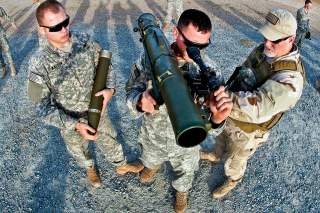Has The U.S. Military Created A Small Class Of Killers?
A veteran reflects on the cost and purpose of the war on terror.
The thin cold air of the Hindu Kush, those legendary mountains, poured through the gunner’s windows onto my shoulders. The 10-minute call went out and I started to check all my gear as I had done maybe 30 times already. It was so dark that I couldn’t see the faces of the men sitting next to me, but I knew them all. Many had spent three or four, in some cases five, years of their lives in Iraq and Afghanistan. Some had lost friends or family or watched others get hurt.
The guys we were going after were hardcore jihadists. One was the child of a Mujahedeen father and a Pashtun mother; he was literally born from the anti-Soviet Jihad. On our bird was a warrior class, touched by the fire and pain of years of continuous combat and at our destination that night was a group of jihadists whose personal history mirrored our own.
I survived the night, but a few weeks earlier a Green Beret leading an Afghan force trying to prevent the capture of Lashkar Gah did not. In death, he joined the around 350 Americans and over 500 other coalition soldiers killed trying to defend the same ground over the previous 14 years.
As his flag-draped coffin was loaded onto a C-17 in the Afghan dawn, I was struck by the thought that perhaps my children will one day fight in those same valleys against the children of my former enemies. I was shaken by the idea of dying for a vaguely defined cause that could send nearly 1,000 men to die in some crap-hole corner of Afghanistan one year only to abandon it the next and then send more men to die to retake it a few years later.
On the plane home I wondered what would have happened if we never tried counterinsurgency. What if we had decided to treat our fight with jihadists like a generational feud where the goal was simply to kill as many of them as possible at the lowest cost to the United States? We would be right where we are today. The only difference would be we wouldn’t have spent trillions of dollars and thousands of lives trying to turn benighted countries into democracies.
Since SOF and the CIA, alongside their increasingly effective partner forces, started their quiet war against jihadist groups from a few major bases, just over 100 Americans have died in jihadist terrorist attacks in the U.S. It is more likely that an American will be shot by a police officer than a jihadist. It is safe to say we have mostly solved the problem presented on September 11th, 2001.
People often complain that killing our way to safety is, to use one of my favorite phrases from the Global War On Terror, “just mowing the grass.” They mean that raids and airstrikes eliminate one generation of terrorist only to have another generation grow up from the roots. More sensitive souls worry that asking a small warrior class to do this preemptive killing for decades may privilege some the worst instincts of our sons and daughters; drug abuse, alcoholism, broken marriages, suicides, violent crime, and brutality in combat. It is a rough world to see up close.
Yet these worries miss the point because the fight against jihadist groups isn’t like a crusade against tyranny or a limited war to keep the communists from expanding their territory. Like previous struggles against pirates, anarchists, and violent crime this fight doesn’t end conclusively. One day, like the great feuds of the Icelandic sagas or the age of anarchist terror, it will simply stop, and no one will remember exactly why it started or why it killed so many people.
To get to that point, America will turn to increasingly smaller circles of elite forces forged over a generation do the killing. Few Americans will actually be touched by this grim fight. This means the circles of sorrow that spread from the loss of a young man or woman remain small. It also means that the resources available remain moderated so that America can continue it.
The dark truth is all the killing at night in far-away places is keeping us safe and we need to continue it indefinitely while keeping the scars on our society and costs to our country a small as possible. America cannot afford to mortgage its future prosperity and spend the capital of its youth on remaking countries in its own image. Because at the end of the day, the leaders go home to paint pictures, passing classified information to their biographers/mistresses, and collect huge speaker and consultant fees while tens of thousands of boy and girls don’t come home or have their lives changed forever.
As a former grunt, my hope for future generations is that the U.S. government and the generals don’t forget this and leave the killing to a small tribe of rough men and women.
Fletcher Schoen is a former U.S. Army Ranger with five and half years of service. He enlisted in the Army in 2012 and finished as a Sergeant in 2017. A graduate of Ranger, Airborne, and Sniper Schools, he deployed twice to Afghanistan with the 75th Ranger Regiment. He currently lives in D.C. and is pursuing his Master’s degree in Security Studies at Georgetown University.
This article by Fletcher Schoen originally appeared at Task & Purpose. Follow Task & Purpose on Twitter. This article first appeared in 2018.
More Articles from Task & Purpose:
- 7 Veteran-Friendly Manufacturers That Are Hiring
- The 6 Types Of Contractors You Encounter Overseas
- Here’s How Marines Fared On The New Physical Fitness Test
Image: Flickr

